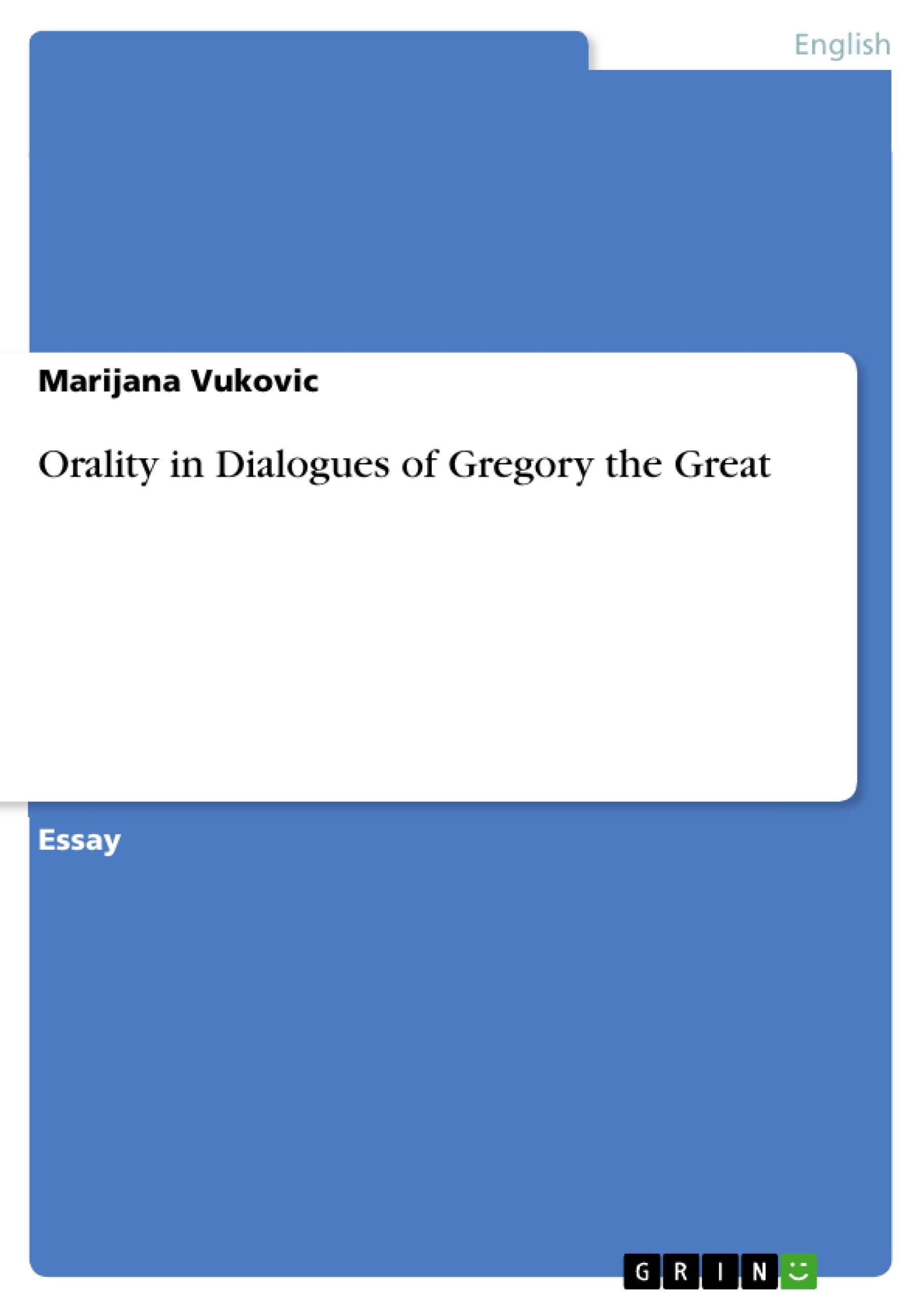Gregory the Great wrote his Dialogues, book II, on the Life of St. Benedict in 593 AD. He is the main authority and virtually unique source on the life of this saint. In fact, this book was written only fifty years after Benedict’s death. At the time relatively close to saint’s life, oral tradition was implemented into written records to a large extent. Gregory often, in citing his sources, mentions personal conversations with other people about Benedict and eyewitnesses of the events.
Gregory was so strongly attached to the figure of St. Benedict that he indicated his respect and love by assigning him a central role in the Dialogues. This collection forms part of that vast corpus of lives of the saints which were produced in the late antiquity and throughout the Middle Ages. The Dialogues consist of four books; the first and third deal with a number of holy persons and their miracles, with the single chapter devoted to each saint, while the fourth book deals with immortality of the soul.
Inhaltsverzeichnis (Table of Contents)
-
- The Life of Benedict
-
- Oral Tradition
-
- The Value of Vitae
- Oral Motifs in the Account
- The Beginning of the Dialogues
- Benedict's Retreat
- Benedict's Monasteries
- The Gift of Prophesy
- Benedict's Healing
- The Power of Prayer
- The Need for Miracles
Zielsetzung und Themenschwerpunkte (Objectives and Key Themes)
This book explores the life of Saint Benedict as documented in Gregory the Great's Dialogues, specifically focusing on the role of orality in shaping and transmitting his story.
- The significance of oral tradition in shaping historical accounts
- The impact of oral sources on Gregory's writings about Benedict
- The importance of vitae as a literary genre in the Middle Ages
- The intersection of historical fact and spiritual belief in the Dialogues
- The use of oral tradition as a means of building faith and hope in times of crisis
Zusammenfassung der Kapitel (Chapter Summaries)
- The Life of Benedict: This chapter introduces Saint Benedict and highlights Gregory the Great's role as a key source for his biography. It emphasizes the importance of oral tradition in recording Benedict's life.
- The Value of Vitae: This chapter explores the significance of vitae as a genre in the Middle Ages. It discusses the historical and spiritual value of these accounts while acknowledging their limitations in terms of factual accuracy.
- Oral Motifs in the Account: This chapter examines the various ways in which oral traditions shaped the narrative about Saint Benedict's life, highlighting the two main categories of oral sources: personal accounts and examples of how news was spread in Benedict's time.
- The Beginning of the Dialogues: This chapter introduces the beginning of Gregory's Dialogues, where he outlines his sources and acknowledges his reliance on oral tradition. It also highlights the credibility he attributed to his sources.
- Benedict's Retreat: This chapter details Benedict's initial retreat to find solitude, focusing on a specific incident involving the repair of a broken vessel and the subsequent spread of his reputation through word of mouth.
- Benedict's Monasteries: This chapter examines Benedict's decision to establish a monastic community after gaining widespread recognition. It highlights the role of oral reputation in attracting followers and the influence of his teaching in Rome.
- The Gift of Prophesy: This chapter focuses on Benedict's ability to prophesy and his meeting with a priest from Canosa. It demonstrates how oral tradition played a role in transmitting Benedict's words and his knowledge of future events.
- Benedict's Healing: This chapter explores Benedict's ability to heal through prayer and recounts specific examples of his cures. It emphasizes the significant role of oral recommendations in connecting those seeking help with Benedict.
- The Power of Prayer: This chapter details an incident where Benedict helps a man in debt by praying and finding gold. It further illustrates the reliance on anecdotes and stories retold through oral tradition, highlighting their potential for embellishment and influence on the audience.
Schlüsselwörter (Keywords)
The book focuses on the intersection of orality, historical accounts, and religious narratives. Key concepts include oral tradition, vitae, Saint Benedict, Gregory the Great, Dialogues, faith, miracles, and historical reconstruction.
Frequently Asked Questions
Who is the primary source for the life of Saint Benedict?
Gregory the Great is the main authority and virtually unique source, having written about Benedict in Book II of his "Dialogues" around 593 AD.
How did oral tradition influence Gregory's writing?
Since Gregory wrote only fifty years after Benedict's death, he relied heavily on oral tradition, citing personal conversations with eyewitnesses and people who knew the saint.
What are "vitae" and why are they important?
"Vitae" are biographies of saints. They were a crucial literary genre in the Middle Ages, serving both as historical records and as spiritual tools to build faith and hope.
What miracles are attributed to Saint Benedict in the Dialogues?
The accounts include instances of healing through prayer, the gift of prophecy (foretelling future events), and the power of prayer to solve material problems, such as finding gold to pay a debt.
How did Benedict's reputation spread during his lifetime?
His reputation grew largely through word of mouth following his retreat for solitude. News of his spiritual power and miracles attracted many followers, eventually leading to the establishment of his monasteries.
What is the structure of Gregory's Dialogues?
The Dialogues consist of four books: the first and third deal with various holy persons and miracles, the second is dedicated entirely to Saint Benedict, and the fourth discusses the immortality of the soul.
- Quote paper
- Marijana Vukovic (Author), 2006, Orality in Dialogues of Gregory the Great, Munich, GRIN Verlag, https://www.grin.com/document/154121



